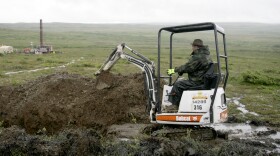
Daysha Eaton
Daysha Eaton holds a B.A. from Evergreen State College, and a M.A. from the University of Southern California. Daysha got her start in radio at Seattle public radio stations, KPLU and KUOW. Before coming to KBBI, she was the News Director at KYUK in Bethel. She has also worked as the Southcentral Reporter for KSKA in Anchorage.
Daysha's work has appeared on NPR's "Morning Edition" and "All Things Considered", PRI's "The World" and "National Native News". She's happy to take assignments, and to get news tips, which are best sent via email.
Daysha became a journalist because she believes in the power of storytelling. Stories connect us and they help us make sense of our world. They shed light on injustice and they comfort us in troubled times. She got into public broadcasting because it seems to fulfill the intention of the 4th Estate and to most effectively apply the freedom of the press granted to us through the Constitution. She feels that public radio has a special way of moving people emotionally through sound, taking them to remote places, introducing them to people they would not otherwise meet and compelling them to think about issues they might ordinarily overlook.
-
Students allege that the university is mistreating victims of sexual assault and harassment, especially women and LGBTQ students.
-
The Church of Jesus Christ of Latter-day Saints will now baptize children of gay couples. The move reverses a controversial decision from 2015 that divided the church.
-
Opponents of the mine are calling on the state's governor to stop the project. The copper and gold mine would be located on state lands near some of the richest salmon fisheries in the world.
-
Alaska Native tribes who claim fishing as a human right have opposed potential gold and copper exploration in Alaska's Bristol Bay area, and are bracing for Pebble Mine to apply for permits.
-
Producers and consumers in southwestern Alaska see one upside to climate change. It's now possible to farm in parts of the tundra where agriculture was unheard of just a few years ago.
-
Israel Keyes confessed to murdering as many as 11 people across the country before killing himself in 2012. But Keyes didn't name his victims, and efforts to identify them have been frustrated by a lack of a federally mandated national missing persons database.






